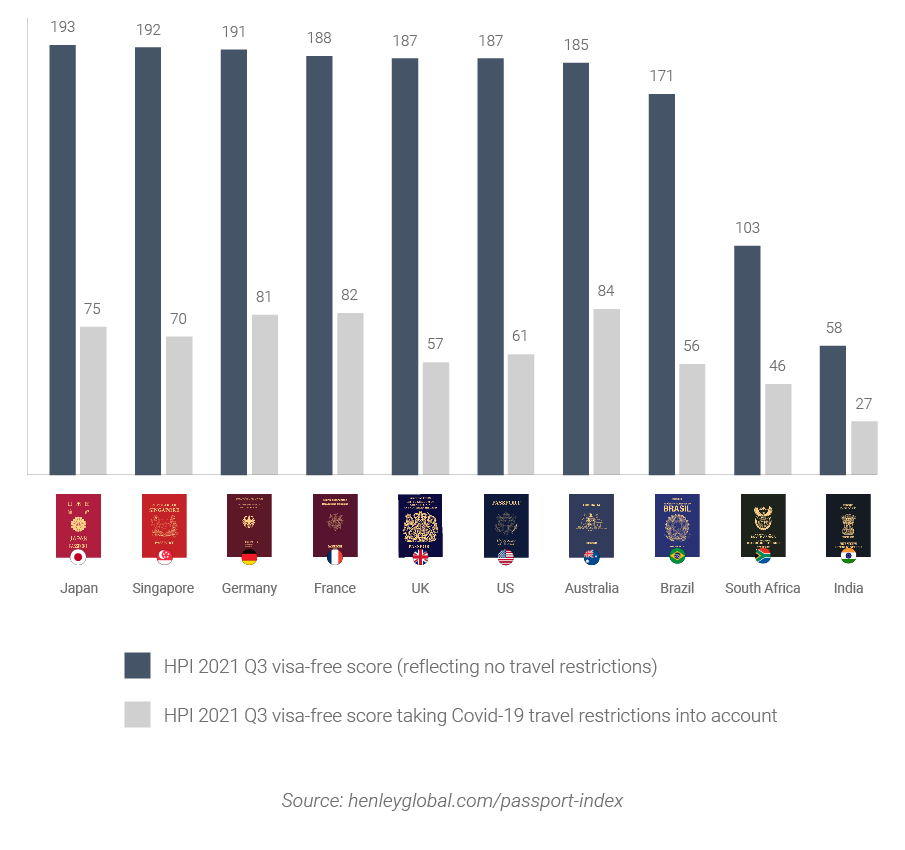SINGAPORE, 7 July 2021: Three Asian states – Japan, Singapore, and South Korea – continue to dominate the Henley Passport Index ranking challenging the 16-year dominance of European passports.
With the postponed Tokyo 2020 Olympics just weeks away, and the country in a ‘quasi’ state of emergency, Japan retains its hold on the number one spot on the Henley Passport Index – based on data from the International Air Transport Association (IATA) – with a theoretical visa-free/visa-on-arrival score of 193.

Singapore retains second place, with a visa-free/visa-on-arrival score of 192, and South Korea continues to share the joint-third place with Germany, each with a score of 191.
As the world scrambles to recover from the effects of the global health emergency, urgent questions around international travel remain: Is a return to pre-pandemic levels possible? How will it be achieved? And who will be left behind?
The latest results and research from the Henley Passport Index show that while there is cause for optimism, it must be tempered with the reality that cross-border travel continues to be significantly obstructed.
Although some progress has been made, between January to March 2021, international mobility had been restored to just 12% of pre-pandemic levels in the same period in 2019, and the gulf between theoretical and actual travel access offered by even high-ranking passports remains significant.
Covid-19 times
However, when compared to the actual travel access currently available during the pandemic even for the holders of top-scoring passports, the picture looks very different. Japanese passports have access to fewer than 80 destinations (equivalent to the passport power of Saudi Arabia, which sits way down in 71st place in the ranking) while holders of Singaporean passports can access fewer than 75 destinations (equivalent to the passport power of Kazakhstan, which sits in 74th place).
Plummeting UK and US passport power
There is a similarly gloomy outlook even in countries with highly successful Covid-19 vaccine rollouts: the UK and the US currently share a joint-7th place on the index, following a steady decline since they held the top spot in 2014, with their passport holders theoretically able to access 187 destinations around the world.
Under current travel bans, however, UK passport holders have suffered a dramatic drop of over 70% in their travel freedom, currently able to access fewer than 60 destinations globally – a passport power equivalent to that of Uzbekistan on the index. US passport holders have seen a 67% decrease in their travel freedom, with access to just 61 destinations worldwide – a passport power equivalent to Rwanda’s on the Henley Passport Index.
For the full details of the latest results and research, check out Henley Passport Index
About the Henley Passport Index
With cutting-edge expert commentary and historical data spanning 16 years, the Henley Passport Index is the original ranking of all the world’s passports according to the number of destinations their holders can access without a prior visa. Originally created by Dr Christian H. Kaelin, the ranking is based on exclusive data from the International Air Transport Association (IATA), which maintains the world’s largest and most accurate database of travel information, and it is enhanced by extensive, ongoing research by the Henley & Partners Research Department.
Along with the Kälin – Kochenov Quality of Nationality Index, it is considered a significant reference tool for global citizens and the standard reference for government policy in this field.







